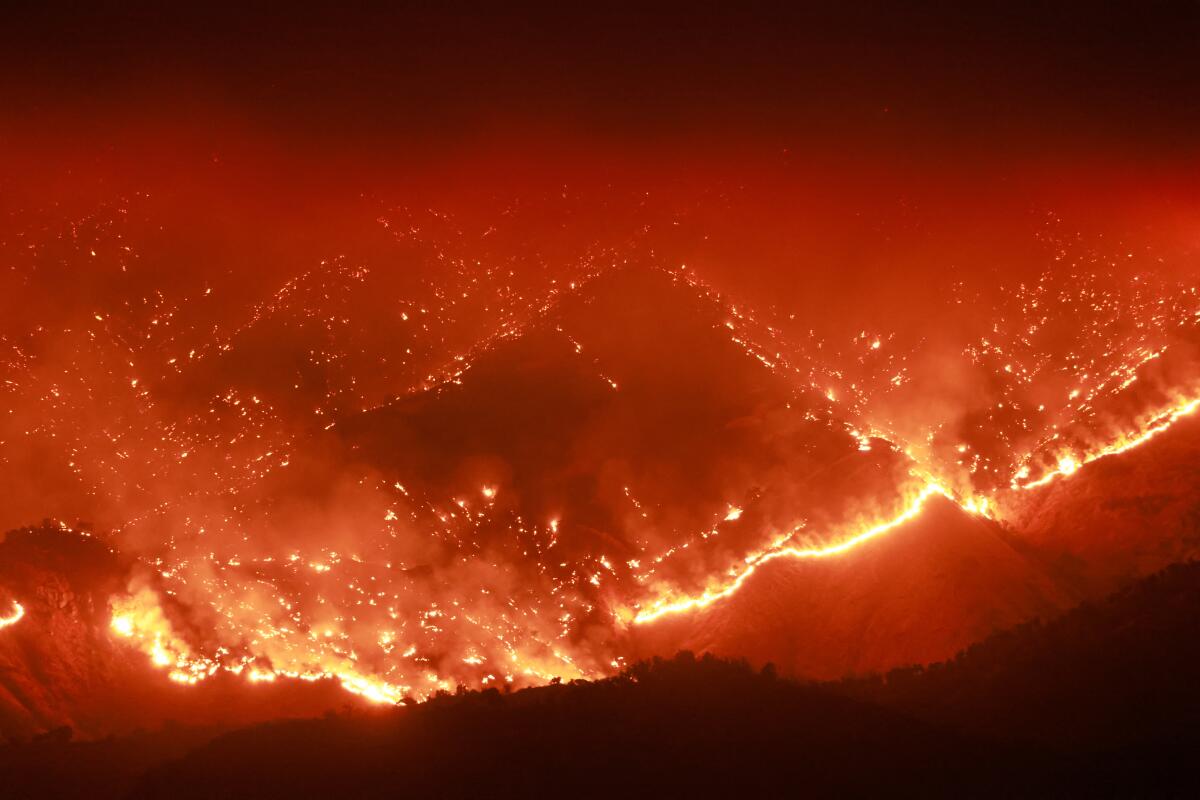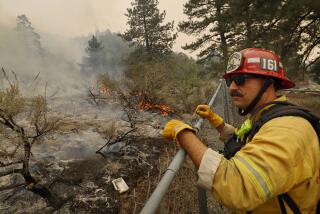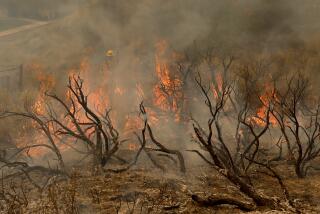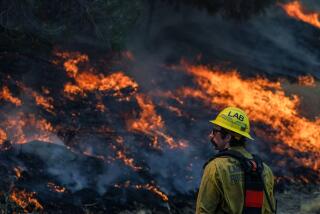Crews turn a corner with California’s largest wildfire as massive heat wave brings new danger

- Share via
California firefighters battling a blaze that has ripped through more than 13,000 acres of the Sierra National Forest just north of the Giant Sequoia National Monument and close to several hydroelectric facilities finally began to gain control Monday afternoon.
Crews had the Basin fire 17% contained after days of being unable to get a handle on the fire.
The wildfire was one of several burning throughout the state as officials braced for the longest heat wave so far this year, set to kick off Tuesday, two days before the Fourth of July. Forecasters predict broiling weather and increased wildfire risks.
“We are starting to see an uptick in fire activity that we have been predicting,” said Robert Foxworthy, spokesperson for Cal Fire. “What’s primarily driving the fires we’re seeing now is those lighter fuels; those grasses ... that dry out quickly are now dead and receptive to fire.”
Two years of back-to-back wet years produced eye-popping blooms and fields of grasslands across the state, which are now browning under punishing heat. And those grasses are already becoming fire fuel.
The heat wave is expected to bring dangerous temperatures through the Fourth of July holiday and into early next week in many areas, particularly across Northern California, the Central Valley and southwestern deserts. Most of Fresno County is under an excessive heat warning from Tuesday through July 9, with the National Weather Service expecting little overnight relief from the high temperatures.
As a result of the Basin fire, officials have evacuated 159 people in the Sierra National Forest, most of whom live at the Balch Camp, an isolated community where Pacific Gas & Electric has facilities that feed into California’s power grid.
“The fire reached pretty close to the camp, but there was no physical damage to the facility,” said Denny Boyles, a PG&E spokesperson.
The fire began north of the Kings River and was spotted by an air attack plane scouting for fires in the area June 26.
The Basin fire was one of 18 that started in the Sierra National Forest on or shortly after June 25, when there was a lightning storm in the area, although the cause of the fire is still under investigation. Most of those blazes kindled in grasslands but burned less than a quarter of an acre.
But the Basin fire took hold. A total of 951 firefighters have worked to contain the fire and keep it from crossing the river on its southern perimeter, where groves of ancient sequoias stand, said Mike Lindbery, a spokesperson for Basin fire.
The Sierra National Forest has issued a temporary closure that will remain in effect until July 30.
Other parts of the state also continued to burn. Cal Fire listed 14 active incidents as of Monday night.
In San Diego County, a car fire is believed to have sparked a 900-acre brush fire Thursday. Dubbed the Mccain 4 fire, the blaze was not contained as of 7 p.m., threatening about 100 structures in Jacumba Hot Springs, said Mike Cornette, a spokesman for Cal Fire San Diego.
Dry grasses struck by lightning June 24 fueled three separate fires in eastern Fresno County that burned more than 10,000 acres but were under control. As of Monday, the Fresno June Lightning Complex fire — which charred antenna towers on Bear Mountain — was 78% contained, and evacuation orders had been lifted.
So far this year, 131,483 acres have been blackened across the state, an early boom in California wildfires. But it’s, as of yet, a fraction of the acreage and loss of life seen in recent years. Foxworthy said, however, it only takes one wildfire to devastate the region.
In 2018, the Camp fire became the deadliest in California’s history, killing 86 people. It began after a PG&E transmission line in the Sierra Nevada foothills malfunctioned. Two years later, wildfires across the state burned 4.3 million acres and 33 people died.
This summer — in the face of an early wildfire season, extreme heat and dense, drying vegetation — Cal Fire has increased its ranks in preparation, Foxworthy said.
“We have extra folks on,” he said, “so we are fully staffed up now.”
Times staff writer Grace Toohey contributed to this report.
More to Read
Sign up for Essential California
The most important California stories and recommendations in your inbox every morning.
You may occasionally receive promotional content from the Los Angeles Times.










